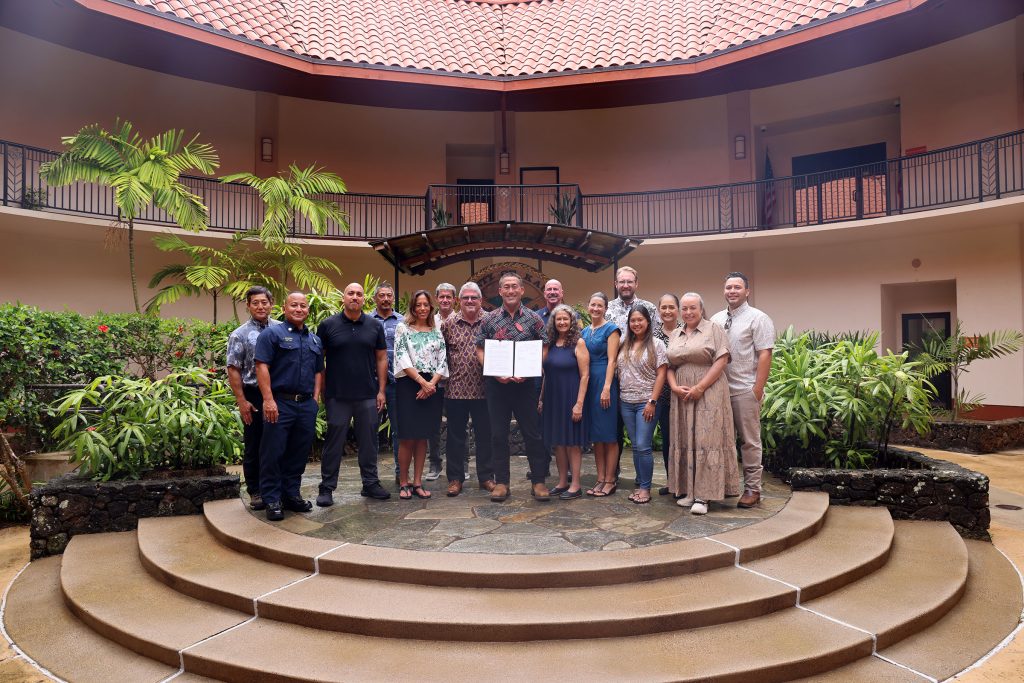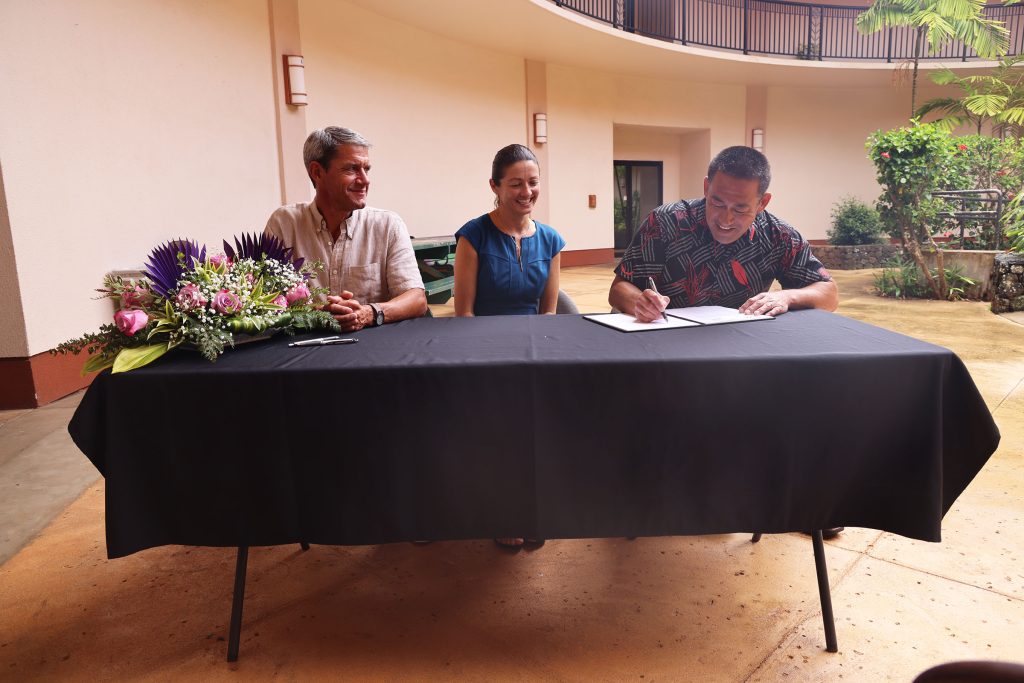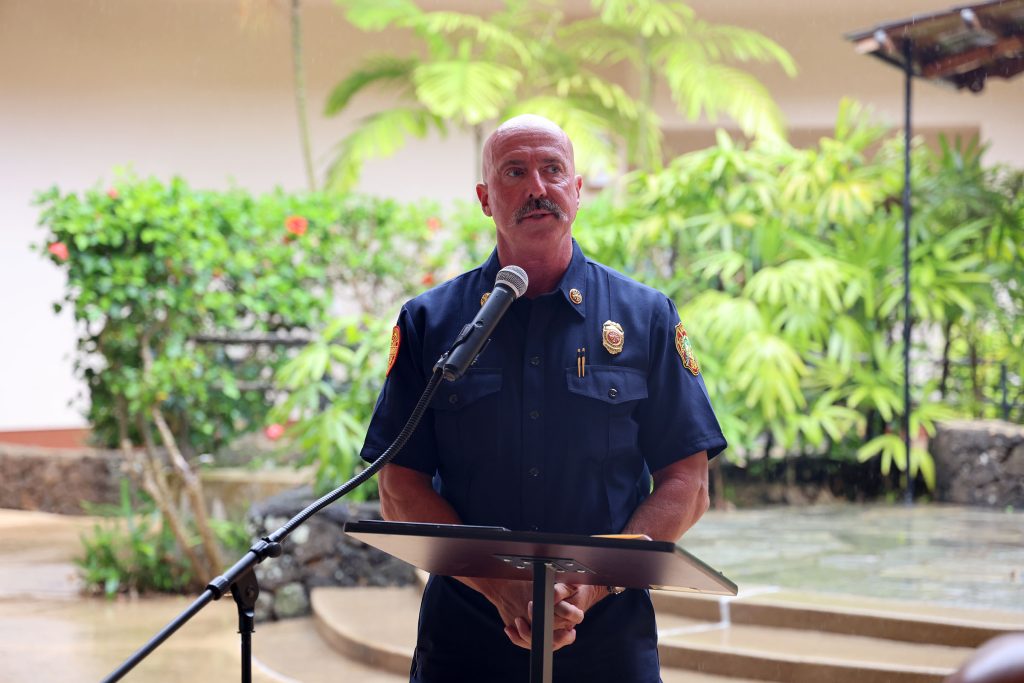Kauaʻi sets new standard with wildfire mitigation ordinance
On Sept. 8, Mayor Derek S.K. Kawakami signed into law Bill 2961, an ordinance passed unanimously by the Kauaʻi County Council to advance wildfire mitigation in West Kauaʻi’s plantation camp districts.

Mayor Kawakami signed Bill 2961 into law, embedding fire mitigation, home hardening, and defensible-space standards into plantation camp codes. The ordinance also updates the West Kauaʻi Community Plan to reflect the wildfire protections.
“Mahalo to the Kauaʻi County Council, our Planning Department, the Hawaiʻi Wildfire Management Organization (HWMO), Headwaters Economics, the Kauaʻi Fire Department, the Kauaʻi Emergency Management Agency, and—most importantly—our community for helping shape this ordinance,” said Mayor Kawakami. “This is about keeping families safe, protecting historic plantation neighborhoods, and doing the simple, proven things that reduce risk before a spark becomes a disaster.”
Bill 2961 is the first Wildland-Urban Interface ordinance in the state of Hawaiʻi to formally tie wildfire safety into zoning and permitting processes, ensuring risk reduction is incorporated into development and property maintenance. It includes Kaumakani Village and Kaumakani Avenue, Numila, and Kaʻawanui, with additional coastal managed-retreat provisions for Pākalā Camp.
“Today’s action integrates safety into the code for plantation camps. The Wildland-Urban Interface standards are now part of permitting and maintenance, focusing on the built environment as well as the fuels that lead to fast-moving fires—guinea grass, haole koa, and buffel grass,” said Planning Director Kaʻāina Hull. “We’ll lead with education and outreach, and in line with the ordinance, formal complaints from the fire chief will trigger enforcement where needed so we can direct resources where they will have the most impact.”

Additionally, a memorandum of understanding was signed on Monday between the County of Kauaʻi, Headwaters Economics, and HWMO to ensure further collaboration on wildfire mitigation efforts.
“The bill signed today helps make Kauaʻi a leader in the nation when it comes to protecting communities from wildfire,” said representatives with Headwaters Economics. “Headwaters Economics is honored to join forces with Kauaʻi County and HWMO so that local communities can make informed decisions that will reduce wildfire risk and protect lives, homes, and cultural resources.”
Bill 2961 introduces new wildfire safety regulations for plantation camps to enhance the safety of homes and families. The changes call for a 5-foot clear zone immediately around houses, with no flammable items, safer spacing, and regular upkeep of plants within 30 feet, as well as low, well-maintained vegetation up to 100 feet.
Homes will need fire-resistant roofs, ember-proof vents, stronger windows, and screened crawl spaces. These updates aim to protect the camps’ historic character while making them more fire-safe for the community.

“This ordinance puts practical tools in people’s hands—simple steps like a noncombustible 5-foot zone, covered metal gutters, ember-resistant vents, and well-kept defensible space have proven to save homes encountering showers of wind-driven fire embers, which is crucial during Red Flag Warning events,” said Kauaʻi Fire Department Chief Michael Gibson. “We’ll continue working with HWMO, landowners, and residents of Kaumakani, Numila, Kaʻawanui, and Pākalā to put these standards into daily practice and keep our communities safer.”
HWMO has long partnered with the County of Kauaʻi on consultation and planning. Their expertise helped shape the technical elements of the ordinance.
“This ordinance is a breakthrough in making wildfire safety part of everyday planning, design, and property care,” said Elizabeth Pickett, co-executive director of HWMO. “It’s about embedding risk reduction into how we build, how we landscape, and how we protect our communities from the start—especially in places as special and vulnerable as our plantation camps.”
The ordinance is effective immediately, applying to all new development applications in plantation camp districts.
To learn more, view Bill 2961 here.



